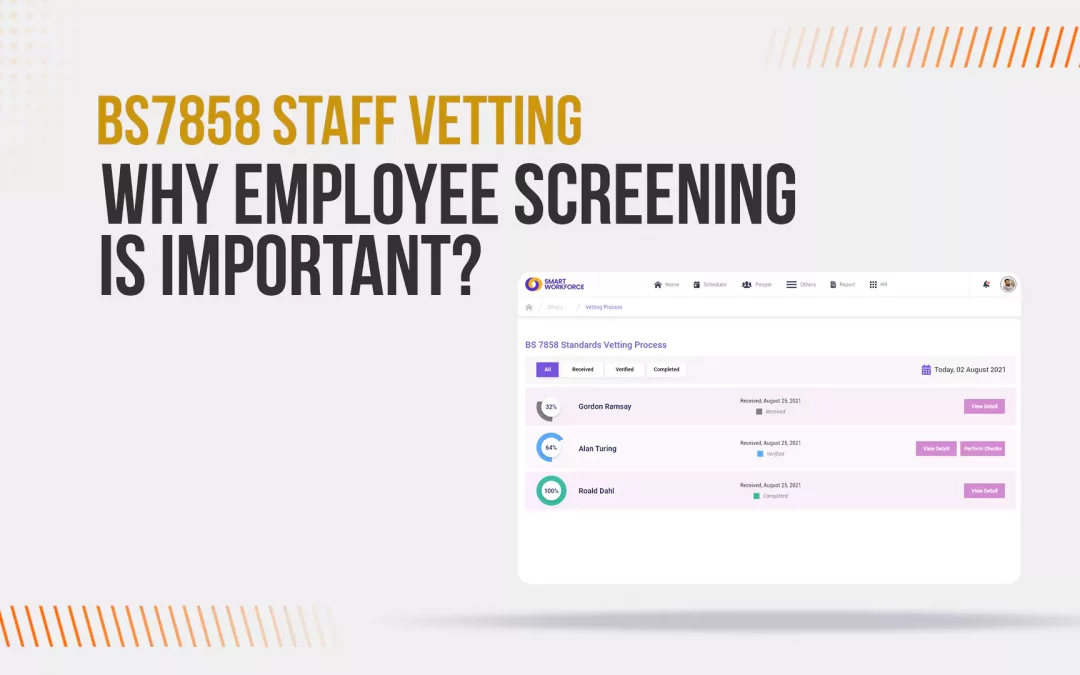The workforce is considered the powerhouse of an organization. The skills and expertise of personnel contribute to organizational growth and development. Irrespective of a company’s scope or sector, employers follow robust recruitment practices to hire the most talented staff meeting their criteria.
Staff vetting is an important part of the recruitment process. Businesses operating in the UK must perform background checks on their employees and screen them against the BS7858 standard. This way, employers can make sure that they are hiring the best possible candidates for the job. Moreover, the BS7858 staff vetting process can protect your business from potential security risks, as well as reduce the risk of theft or fraud.
In this article, we’ll cover the basics of BS7858 staff vetting and discuss its importance for businesses of all sizes.
So let’s get started!
What is BS7858 Staff Vetting?
The BS7858 is a security standard created by the British Standard Institute. It covers the vetting of individuals who work in high-risk security environments. Besides, BS7858 sets out the minimum requirements for security screening. The standard aims to help organizations identify individuals who might pose a security risk.
The BS7858 staff vetting includes several measures that organizations can take to vet employees. Some of these include:
- ID verification
- 31-day employment gap check
- 5-year academic and career history check
- Right-to-work verification
- 5-year address verification
- Credit and sanctions list check
- Basic DBS Criminality Check
Importance of Staff Screening
Staff screening is one of the most important aspects of the organizational hiring process. Just because candidates have the required skills and expertise doesn’t mean they are necessarily qualified for that job.
Staff screening as be the BS7858 staff vetting standard is important. It helps employers ensure that their team members are actually qualified to do the job they’re supposed to be doing. Besides, employee screening can help you prevent things like fraud and theft. If you know that your employees have been properly vetted, then you can be sure that they’re not going to try to steal from you or commit fraud.
Hence, if you are hiring staff for your organization, make sure they are properly vetted as per the BS7858 standards.
Benefits of BS7858 Staff Vetting
The BS7858 staff vetting standards outline the requirements for employee screening. While it might seem like something only relevant to businesses in the UK, these standards can be applied to any business, anywhere in the world.
So why is BS7858 staff vetting so important? Here are a few key benefits:
- It helps employers ensure the safety of their employees. By screening new hires, you can select professionals with the right skills and qualifications and clear backgrounds. Eventually, employers can create a safe work environment for all of their employees.
- Secondly, BS7858 staff vetting protects your business from liability. If an employee is found to be responsible for a crime or incident, your business could be held liable. By screening staff, you protect your business from this type of liability.
- Similarly, staff screening enables employers to create a positive work environment. When everyone working for your company is qualified and skilled, it creates a supportive work environment that leads to increased productivity and morale.
How Does the BS7858 Staff Vetting Process Work?
The whole process of BS7858 staff vetting is straightforward. Businesses can leverage technology to automate the screening process and get detailed reports online.
Let’s break it down so you can see how online BS7858 staff screening works:
- First of all, employers have to submit the names and contact details of their employees. Online vetting agency then runs background checks and verify their identity and work and educational history.
- The next step is to check their criminal records. This is performed by searching the Police National Computer (PNC) and other relevant databases. This gives the agency an idea of any previous convictions or cautions that employees may have.
- The third step is to complete an assessment of workers’ character. This includes interviewing references and speaking to other people who know the person in question. Some agencies also look at any social media activity that might give some valuable insights.
- Once all this information is collected, a final report is compiled and submitted to the client. From there, the employer can decide whether or not to proceed with hiring the person in question.
Who Needs to Be Screened?
Some employers often get confused about which employees need to be screened. Well, it depends on the job. For example, employees working with security agencies need rigorous screening. It’s important to do a background check to make sure they don’t have a history of violence or abuse.
Similarly, if an employee is handling money, you’ll want to do a credit check to make sure they’re not bankrupt or in debt. Lastly, companies handling customers’ sensitive information should perform background checks to see if their employees have any history of fraud or identity theft.
The screening process is different for every job, but the bottom line is that it’s important to do your research and figure out what’s best for your company.
Conclusion
Staff screening as per the BS7858 standards determines the resilience and efficiency of an organization. It is a well-recognized British standard that gives employers peace of mind and helps them avoid potential problems down the road.
If you are looking for reliable BS7858 staff vetting solutions, consider Smart Workforce. Our cloud-based workforce management software completes the BS7858 staff vetting process online. You can download the detailed final report within 15 days and hire the most qualified staff that meets your criteria.
